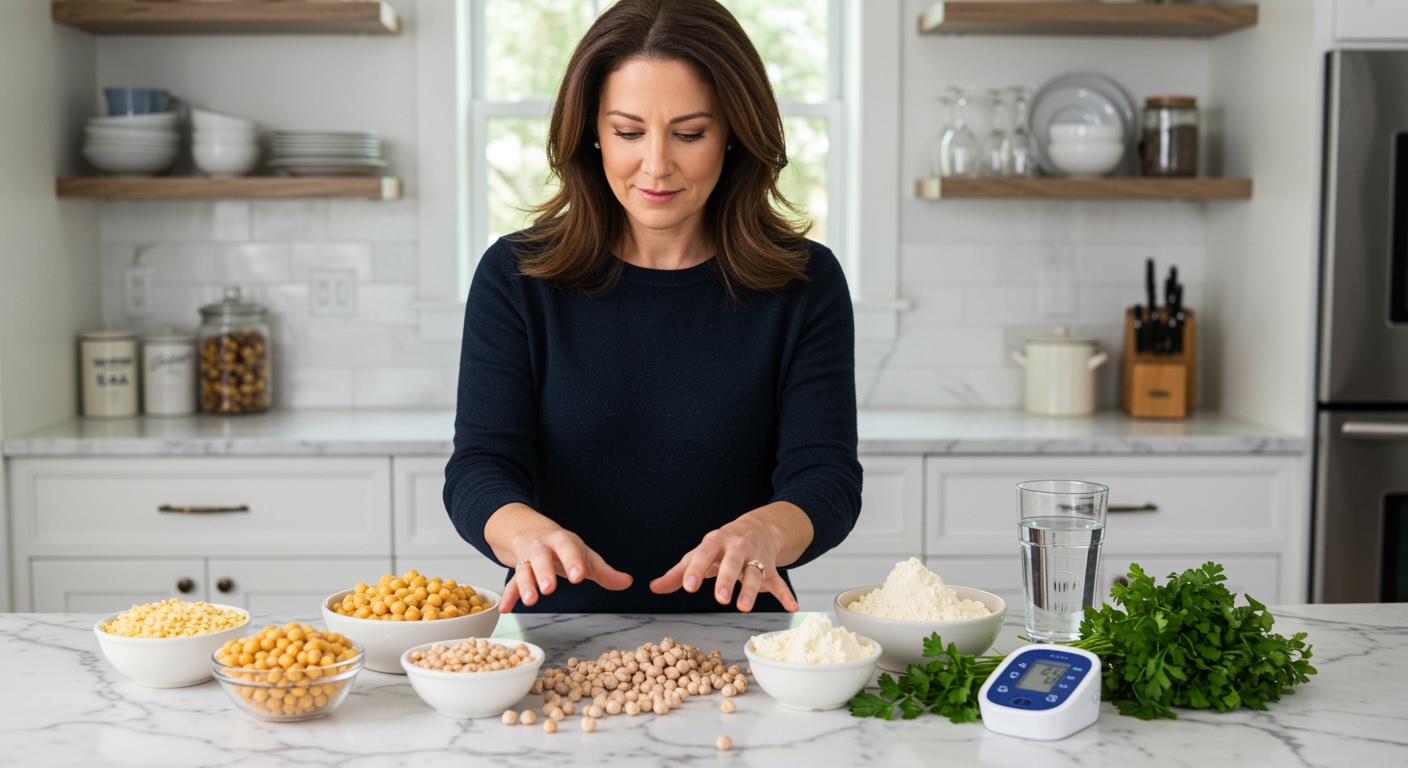✪ Key Takeaway: Chickpeas may help stabilize blood pressure through potassium and magnesium, but low blood pressure patients should monitor portions carefully.
Introduction
Your doctor just told you that your blood pressure is too low, and now you are wondering if chickpeas can help.
You might be asking this question because you have heard that chickpeas are heart-healthy, but you are not sure if they work the same way for low blood pressure as they do for high blood pressure.
Hi, I am Abdur, your nutrition coach, and today I am going to explain exactly how chickpeas affect your blood pressure and whether they can help people with hypotension.
How Do Chickpeas Affect Blood Pressure Naturally?
Chickpeas contain several nutrients that directly influence your cardiovascular system and blood pressure regulation.
The potassium in chickpeas helps your blood vessels relax and improves blood flow throughout your body.
One cup of cooked chickpeas provides about 477 milligrams of potassium, which is roughly 10 percent of your daily needs.
Magnesium in chickpeas also supports healthy blood vessel function by helping your heart muscle contract and relax properly.
The fiber content in chickpeas can help stabilize blood sugar levels, which indirectly affects your blood pressure stability throughout the day.
Research shows that people who eat legumes like chickpeas regularly tend to have more stable blood pressure readings compared to those who avoid them.
✪ Fact: Chickpeas contain more potassium per serving than bananas, making them excellent for cardiovascular health.
Can Chickpeas Help Raise Low Blood Pressure?
The relationship between chickpeas and low blood pressure is more complex than most people realize.
Chickpeas do not directly raise blood pressure like sodium-rich foods do, but they can help stabilize your cardiovascular system.
The protein content in chickpeas helps maintain steady blood sugar levels, which prevents the blood pressure drops that often happen after meals.
When your blood sugar stays stable, your blood pressure is less likely to fluctuate dramatically throughout the day.
The B vitamins in chickpeas, especially folate, support healthy red blood cell production, which can improve circulation in people with low blood pressure.
However, chickpeas alone will not cure hypotension, and you should not rely on them as your only treatment approach.
✪ Pro Tip: Combine chickpeas with a small amount of sea salt to enhance their blood pressure stabilizing effects.
What Is The Best Way To Eat Chickpeas For Low Blood Pressure?
The way you prepare and eat chickpeas can significantly impact their effects on your blood pressure.
Eating chickpeas with a small amount of natural salt can help people with low blood pressure because sodium helps retain fluid and maintain blood volume.
Roasted chickpeas with sea salt make an excellent snack that provides both sustained energy and gentle blood pressure support.
Adding chickpeas to soups or stews with vegetables creates a balanced meal that supports overall cardiovascular health.
You should eat chickpeas as part of regular meals rather than large amounts at once to avoid digestive discomfort.
Start with half a cup of cooked chickpeas per day and gradually increase to one cup if your body tolerates them well.
✪ Note: Soak dried chickpeas overnight and cook them thoroughly to improve digestibility and nutrient absorption.
Are There Any Risks Of Eating Chickpeas With Low Blood Pressure?
Most people with low blood pressure can safely eat chickpeas, but there are some important considerations to keep in mind.
Chickpeas are high in fiber, which can cause bloating and gas if you eat too many too quickly.
The potassium content in chickpeas might interact with certain blood pressure medications, so you should discuss this with your doctor.
Some people experience digestive upset when they first start eating chickpeas regularly, especially if they are not used to high-fiber foods.
If you have kidney problems along with low blood pressure, the protein and potassium in chickpeas might need to be monitored more carefully.
Always start with small portions and pay attention to how your body responds before making chickpeas a regular part of your diet.
✪ Pro Tip: Drink plenty of water when increasing fiber intake from chickpeas to prevent digestive discomfort.
The Bottom Line
Chickpeas can be a helpful addition to your diet if you have low blood pressure, but they work best as part of a comprehensive approach to managing hypotension.
The key to managing low blood pressure is consistency in your daily habits, not searching for miracle foods.
I would love to hear about your experience with chickpeas and low blood pressure, so please share your thoughts or questions in the comments below.
References
At NutritionCrown, we use quality and credible sources to ensure our content is accurate and trustworthy. Below are the sources referenced in creating this article:
- University of Connecticut Extension: The Health Benefits of Chickpeas
- PMC: Nutritional and Health Benefits of Chickpeas
- WebMD: Health Benefits of Chickpeas
- MedicineNet: Why Are Chickpeas Bad for You





